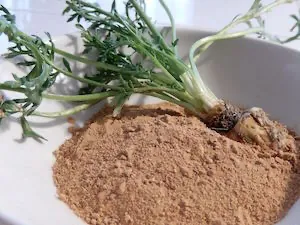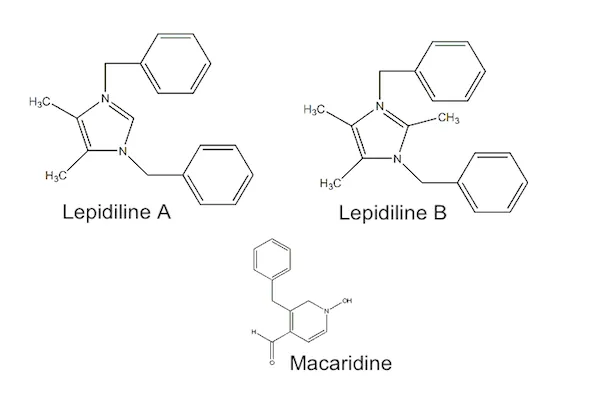Overview of Maca
Scientific Name: Lepidium meyenii
Order: Brassicales
Family: Brassicaceae
Also known as peruvian ginseng.
Strong:
insufficient informationGood:
insufficient informationPromising:
insufficient informationConflicting (Unclear):
insufficient informationLimited Evidence:
- Menopause Induced Sexual Dysfunction [1]
- Mild Erectile Dysfunction [2]
- Osteoarthritis, a maca blend containing Uncaria guianensis [3]
- Selective Serotonin Reuptake Inhibitors (SSRI) Induced Sexual Dysfunction [4]
- Male Sexual Health [5]
No Evidence:
- Increase Testosterone [6]
No Clinical Research:
All other conditions.- Side effects have not been studied.
- Use caution or contact a licensed healthcare practitioner, if you have hormone dependent conditions and cancers.
- Maca may increase blood pressure.
There is not enough research on the use of supplements containing maca during pregnancy and breast-feeding, so consult a licensed healthcare practitioner before use or avoid use. [7-8]
Major:
insufficient informationModerate:
insufficient informationPotential:
- Hormone-Like Drugs
Maca is not a "drug", so the best doses have not been thoroughly established. Make sure to follow the specific product instructions and take as directed on the label, or consult a licensed healthcare practitioner before use.
1. Brooks NA, Wilcox G, Walker KZ, Ashton JF, Cox MB, Stojanovska L. Beneficial effects of Lepidium meyenii (Maca) on psychological symptoms and measures of sexual dysfunction in postmenopausal women are not related to estrogen or androgen content. Menopause. 2008 Nov-Dec;15(6):1157-62. 2. Zenico T, Cicero AF, Valmorri L, Mercuriali M, Bercovich E. Subjective effects of Lepidium meyenii (Maca) extract on well-being and sexual performances in patients with mild erectile dysfunction: a randomised, double-blind clinical trial. Andrologia. 2009 Apr;41(2):95-9. 3. Mehta K, Gala J, Bhasale S, Naik S, Modak M, Thakur H, Deo N, Miller MJ. Comparison of glucosamine sulfate and a polyherbal supplement for the relief of osteoarthritis of the knee: a randomized controlled trial [ISRCTN25438351]. BMC Complement Altern Med. 2007 Oct 31;7:34. 4. Dording CM, Fisher L, Papakostas G, Farabaugh A, Sonawalla S, Fava M, Mischoulon D. A double-blind, randomized, pilot dose-finding study of maca root (L. meyenii) for the management of SSRI-induced sexual dysfunction. CNS Neurosci Ther. 2008 Fall;14(3):182-91. 5. Gonzales GF, Córdova A, Vega K, Chung A, Villena A, Góñez C, Castillo S. Effect of Lepidium meyenii (MACA) on sexual desire and its absent relationship with serum testosterone levels in adult healthy men. Andrologia. 2002 Dec;34(6):367-72. 6. Gonzales GF, Córdova A, Vega K, Chung A, Villena A, Góñez C. Effect of Lepidium meyenii (Maca), a root with aphrodisiac and fertility-enhancing properties, on serum reproductive hormone levels in adult healthy men. J Endocrinol. 2003 Jan;176(1):163-8. 7. DerMarderosian A, Beutler JA. The review of natural products: the most complete source of natural product information. 7th ed. St. Louis, MO, USA: Wolters Kluwer Health; 2012. 8. Valentová K, Stejskal D, Bartek J, Dvorácková S, Kren V, Ulrichová J, Simánek V. Maca (Lepidium meyenii) and yacon (Smallanthus sonchifolius) in combination with silymarin as food supplements: in vivo safety assessment. Food Chem Toxicol. 2008 Mar;46(3):1006-13. 9. DerMarderosian A, Beutler JA. The review of natural products: the most complete source of natural product information. 7th ed. St. Louis, MO, USA: Wolters Kluwer Health; 2012. 10. Srikugan L, Sankaralingam A, McGowan B. First case report of testosterone assay-interference in a female taking maca (Lepidium meyenii). BMJ Case Rep. 2011 Mar 25;2011. 11. Afendi FM, Okada T, Yamazaki M, Hirai-Morita A, Nakamura Y, Nakamura K, Ikeda S, Takahashi H, Altaf-Ul-Amin M, Darusman LK, Saito K, Kanaya S. KNApSAcK family databases: integrated metabolite-plant species databases for multifaceted plant research. Plant Cell Physiol. 2012 Feb;53(2):e1.

